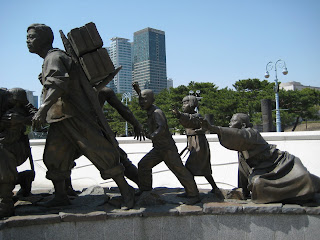The 2002 FIFA World Cup was held in Seoul. The entire country was united as one as Koreans ardently rooted for their home team. Millions in red t-shirts joined in cheering the players onto unprecedented success in the history of Korean soccer. Even workaholics put watching games as a priority over work. The media named these obsessively impassioned Koreans the 11th player in the field. Koreans all over the world shared in their victory--except me.

I didn't understand why it was such a big deal for Korea to win. Above all, I didn't understand the mass hysteria they called patriotism. It seemed like Korean people were reveling more in the drama of the event rather than their love for the country. To me, they were swept by collective hypnotism caused by fanatic nationalism. I didn't understand this endemic psyche of the Korean people only until very recently.
Yesterday, I went to the War Memorial of Korea, a museum that houses the 5000-year history of wars. But because of its chronological proximity to the present time, and the availability of materialistic sources, one-third of the museum was dedicated to the retelling of the Korean War.
My Dad talked about the war often because he saw and lived through its many catastrophic events. He told me the stories of war-orphans, childless mothers, starving people living among piles of rotting corpses. The reality of such a past hit me as I walked through the museum and watched the documentary footage of the war.

The Korean War broke out only 5 years after Korea was liberated from the Imperial Japan who occupied Korea for 35 years. The memories of oppression, and the smell of war are still fresh within the minds of the older generations and their stories are passed onto their children, grandchildren and great-grandchildren. The nascent freedom of the Republic of Korea was bought with the lives of 2 million people in the span of 3 years after the war ended in 1953. An armistice was signed that restored the border between the two Koreas at the 38th parallel and created the Korean Demilitarized Zone (DMZ).
After having walked through the museum, I understood the source of the fervent "madness" with which the Koreans cheered for their team. What brought the Korean people together was not their love for drama, but their bare-knuckled tenacity to unite to survive and triumph. For the first time in my life, I felt my personal history merge with the collective history of the Korean people. It felt as though the blood of its history was running its course through the vein of my ante-natum past.



This is a blood-stained flag that was used to inflame patriotism among Koreans when revolutionaries attempted to free Korea from Japanese imperialism.

During and after the war there were no buildings to hold classes in so students studied outside on the ground.

Books they used

Many survived with only one spoonful of food a day.

Children selling fruits and cigarettes to survive.

People lining up for their ration of food.

So-called "Oink,Oink" porridge. It was made with the thrown-out left-overs by the American soldiers.

The armistice that ended the war













